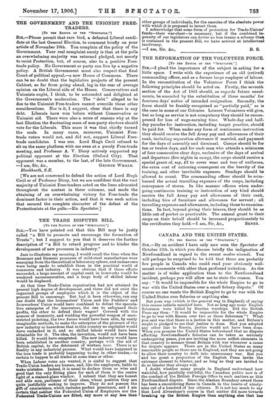THE TRADE DISPUTES BILL.
[TO THE EDITOR OF THE "SPECTATOR:1
Sia,—You have pointed out that this Bill may be justly called "a Bill to promote and encourage the formation of Trusts " ; but I suggest to you that it deserves the further description of " a Bill to retard progress and to hinder the development of new processes in industry."
Just to illustrate my meaning, I would recall the time when the Bessemer and Siemens processes of mild-steel manufacture were emerging from the theoretical or laboratory sphere, and endeavours were being made to establish them in the practical world of commerce and industry. It was obvious that if these efforts succeeded, a large amount of capital sunk in ironworks would be rendered unremunerative, and a large body of skilled labour would be displaced.
At that time Trade-Union organisation had not attained its present high degree of development, and there did not exist the organised groups of employers which it is the object of the present Bill to encourage. But had it been otherwise, can any one doubt that the Ironmasters' Union and the Puddlers' and Ironworkers' Union would have combined to defeat the specula- tive enterprise of the innovators, the one to safeguard their profits, the other to defend their wages ? Covered with the armour of immunity, and wielding the powerful weapon of unre- stricted picketing, the two forces would have been able, by easily imaginable methods, to make the enterprise of the pioneers of the new industry so hazardous that in this country no capitalist would have embarked in it, and no skilled labour would have been obtainable for it. The idea, the invention, would not have been killed. It would have emigrated. The new industry would have been established in another country, perhaps with the aid of British capital, to the detriment of workers hero. There is no finality in any industrial process. What would have happened in the iron trade is probably happening to-day in other trades,—is certain to happen to all trades at some time or other.
When Labour votes are wanted, it is sinful to suggest that Trade-Union leaders are human, and, like the employers, liable to make mistakes. Indeed, it is usual to declare them so wise and vod that the only fitting place for each of them is the centre light of ,a stained-glass window. I submit that they are honest and able men, partisans of their claw, whose position they are quite justifiably seeking to improve. They do not possess the gift of omniscience, which includes perfect prescience, and I am certain that neither the Federated Union of Employers nor the Federated Trade-Unions are fitted, any more or any less than other groups of individuals, for the exercise of the absolute powe* with which it is proposed to invest them.
I acknowledge that some form of protection for Trade-Unions' funds—their war-chest—is necessary, bat if the oombined
in-
genuity of our legislators can devise no less insane a scheme theft is contained in the present Bill, we have arrived at intellectual
insolvency. •


























































 Previous page
Previous page